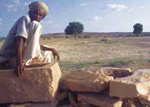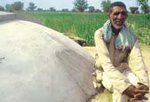| |
| THAR
DESERT |
Jawan
Lal Rebari
Initially involved in adult education and health activities,
Jawan Lal took it as a challenge to transform degraded lands
to productive assets in Barwa village for about 110 families.
Jawan Lal says, "We realised the importance of water and
afforestation early, but people were not ready to join us and
it took us one year to win them over to our way of thinking."
The panchayat, which was reluctant to hand over the degraded
lands, was persuaded by Jawan Lal. But more problems cropped
up when the villagers were misinformed that the land to be developed
would be occupied by Seva Mandir. Finally, after a lot of clarifications
and meetings the matter was settled. In early 1980s, he played
a key role in constructing a check dam in collaboration with
the village panchayat. This was followed by the construction
of ponds in 1998 and 2000. Jawan Lal wants to extend the watershed
management programme to improve the standard of the farming
sector in the village. Arranging a separate meeting for women
helped in overcoming the attendance problem owing to the purdah
system.
Jawan Lal says, "Our women handle their own meetings
separately and they have opened their savings account also.
Savings have grown up to Rs 2,30,000." Today, he stands
tall amongst other village leaders for his uprightness and
dedication.
|
|
|
Laxmi
Narayan joshi,
Laxmi Narayan Joshi, watershed committee chairman of Saipur
village, has been a source of inspiration for the villagers.
The watershed work started in 1998-99. Medbandi, a stone
embankment built on the lower side of an agriculture field on
a hill slope to conserve soil and moisture and help create a
level field for cultivation was done in about 300 hectares of
agricultural land. A pond of about 1.5 ha with 8,000 cubic metre
storage capacity was also built.
Joshi says, "There was a lack of vegetation in the watershed
area which resulted in soil and water erosion. Improper management
of soil and water resources in the area led to poor recharging
of the well and it affected the supply of fuel and fodder."
Due to medbandi in agricultural fields, water requirement
of plants is being met better. The villagers have also been
convinced to replace wheat with sarson (mustard), jau
(oats) and channa (gram), crops that require less
water.
"It is easy and judicious to promote water efficient
crops in our area. We have planted 6,000 trees in 62 ha land.
It promotes groundwater recharge by reducing the flow,"
Joshi adds.
|
|
|
Maharaja
Gaj Singh
Though he has lost the political authority over the people
of Thar, who once used to be his subjects, Maharaja Gaj Singh
continues to work for their well-being. This 38th Rathore Chief
of Marwar, lovingly known as Bapji, is actively involved in
popularising community-based water harvesting practices in the
Thar region.
Concerned with the growing water crisis, he teamed up with
Rajendra Singh, the secretary of the Alwar-based non-governmental
organisation (NGO) Tarun Bharat Sangh, to organise Jal Chetna
Yatras and sammelans to spread the message. His ability
to relate to the villagers in their own language, and addressing
their livelihood concerns has earned him creditability and
support of the people of Pali, Barmer and Jalore districts
of western Rajasthan. Due to his concerted efforts he has
also generated interest among the other sardars of the former
princely states of Jodhpur, Nagaur, Jaisalmer, Barmer, Jalore,
Sirohi and Pali to take up similar activities.
Working as a catalyst, the Maharaja is motivating locals
to get involved and work for a better (and wetter) future
instead of relying on state handouts. In return, he has received
complete cooperation from the people. While expressing his
gratitude, Bapji said, "In the present context maharajas
no longer have wealth. I am lucky to have invaluable wealth
in the form of your support and dedication to mitigate this
perpetual problem." A royal water crusader, indeed.
For details:
Brig Shakti Singh
Umaid Bhavan Palace,
Jodhpur, Rajasthan
Tel: 0291-2510101
marwar@del3.vsnl.net.in
|
|
|
 Magga Ram Suthar
Magga Ram Suthar
|
Magga ram suthar
Magga Ram Suthar, 67, makes beris
or kuis. He belongs to the Suthar (carpenter) community
and comes from Pithala's only Suthar family. He also knows how
to catch the meagre rainfall (annual average: around 160 mm)
in the area during the monsoon.
In Pithla, groundwater can be struck at a depth of 90-107 m,
and this water is mostly saline. In many areas, however, a rocky
belt of gypsum, known as bittoo, runs under the surface.
It is this belt of gypsum that is the key to Maggar Ram's method
of water harvesting.
During the digging of a beri, once the bittoo level
is reached, it is lined with stones.
An interesting feature is the shape of beri in areas
where the bittoo is found at a shallow level - the mouth
of the beri is made narrower to prevent water loss by
evaporation. It gets wider as the depth increases, giving greater
surface area for water to seep in.
Magga Ram constructed his last beri 15 years ago. Today,
there is no demand for new beris. In 1991 a government
tubewell struck fresh water some seven km away from Pithala.
This water reaches the village through a pipeline. But even
today, when this tubewell fails, villagers walk up to Magga
Ram's beris.
|
|
|
Premjibhai
Patel
Premjibhai Patel had to go to Mumbai for work in 1975 but the
fast-paced lifestyle and a desire to do something meaningful
perturbed him endlessly. Finally, he returned to his village
Bhayavadar in Upleta block of Gujarat. There he brought about
a revolution of sorts. One that showed people that the answer
to the fuelwood problem in the arid region was growing simply
more trees. This also solved the problems of erosion and water
shortage. Now, he is concentrating on the construction of traditional
check-dams in Upleta. |
|
|
 Rajendra Singh
Rajendra Singh
|
Rajendra Singh
On October 2, 1985, five young men got off a bus at Kishori
village in Thanagazi block of the district of Alwar, Rajasthan.
They were from the Tarun Bharat Sangh (TBS), a voluntary organisation
set up in 1975. Among them was Rajendra Singh, the secretary
of TBS. Rajendra Singh spearheaded the movement for the regeneration
of the area. Always an activist, he had fought against illegal
quarrying in the Sariska Tiger Reserve, Rajasthan. No engineers
were called. They were guided by traditional wisdom. Mangu Lal
Patel, an old man from nearby village Gopalpura told them, "Do
not talk too much; dig tanks and build johads.
You will get results."
This year, on July 30, 2001 Rajendra Singh was conferred the
Magsaysay award for community leadership. When the news reached
him, he was touring Sikar, Rajasthan to do what he does best
- mobilize communities to manage their water resources. On receiving
the award, Singh said, "The social technique adopted by
the people and TBS has been recognised with the achievement
of this award. The award is for the people."
For details:
Rajendra Singh
Tarun Bharat Sangh (TBS)
Bhikampura-Kishori Thanagazi
Alwar-301022
Tel- 01465-25043
|
|
|
 Ran Singh
Ran Singh
|
Ran Singh
Ran Singh of Lahsedi village, district Churu. Rajasthan makes
kundis.
Ran Singh started building kundis since he was 13 years
old. So far, he has built some 400 or 450 kundis. With
local groundwater being saline, these kundis
are the main source of water for the villagers.
A tall, well-built, articulate man of 62, Ran Singh says, "Pipelines
are most unpredictable. The government waterworks are like waterless
eyes that cannot see. What is their use?"
He understands rain and the behaviour of water - how it travels
and how it should be stored. Making a kundi needs considerable
engineering skills and takes about 25 days. After selecting
an appropriate area, the first consideration is the incline,
asit should catch as much rainwater as possible.
Kundis have brought Ran Singh a lot of respect in his
village. Visitors throng his house almost every day. People
greet and salute him as he walks down the local street. He is
always eager to share a joke with his neighbours. Despite his
age, a good joke is never lost on him. He catches it like water. |
|
|
| <<back
|
|
|
|






